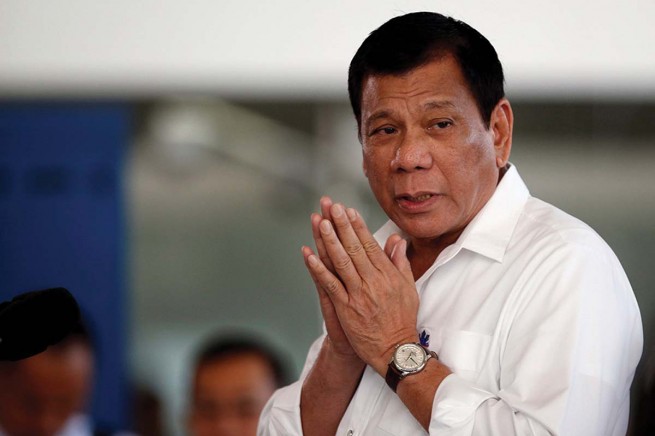MANILA – President Rodrigo Duterte on Tuesday, September 26 urged the United States to work closely with his government against drug smuggling, saying international syndicates are using the Philippines as the transshipment point.
In a speech, Duterte claimed that the so-called Taiwan-based Bamboo triad and Hong Kong-based 14-K triad were using the country as a hub for shipping drugs to other countries, including the U.S.
“The Philippines is a transshipment of shabu (crystal meth) to America and it behooves upon America to work closely with the Republic of the Philippines, especially on this serious matter,” Duterte said at the 56th-anniversary celebration of the Philippine Constitution Association.
“We are flooded with drugs and the locals here have been taken in but they participate in the [production] of the selling. And I think they are happy because they are protected,” the president added.
Duterte won the presidential elections last year with curbing narcotics as among his major campaign promises.
Washington has expressed its support to the Philippine government’s efforts in fighting illegal drugs but has denounced the alleged killings and human rights abuses in the so-called drug war.
Duterte said about 40 percent of barangays in the Philippines are affected by the drug menace, which he called a “disease.”
He reiterated his warning against drug personalities, saying he would not hesitate to kill them if they destroy the future of the country. He clarified, however, that due process will be observed during operations.
“When it comes to this country, I could be the most brutal but I do not lose sight of the Constitution… I have been a prosecutor, I know what due process means,” Duterte said. “I do not want killing innocent Filipino people.”
Friendlier with the US
In a speech on Thursday, September 28, Duterte said he’s now on friendlier terms with the U.S.
During the 116th commemoration of the Balangiga Encounter Day in Eastern Samar, Duterte said the U.S. government has “redeemed themselves a lot.”
Duterte has repeatedly slammed Washington for urging Manila to stop the supposed drug war deaths, accusing the U.S. of interfering in the domestic affairs of the Philippines.
“There are so many factors involved but I’d rather be friendly to them now because aside from these episodes of, I said, sad incidents, overall I think the Americans also redeemed themselves a lot,” the president remarked.
Known for his expletive-peppered speeches, Duterte added that he was also advised by the Philippines Department of Foreign Affairs (DFA) to “temper [his] language.”
“I was under advice that the negotiations are going on, that the government of America is looking for ways how to get out of this problem of the Balangiga bells because it remains to be not only the source of irritation but the source of a painful reaction, what really happened to our countrymen,” he said.
In his second State of the Nation Address (SONA) last July, Duterte asked the Washington to return the bells of Balangiga church in Samar, which were seized by U.S. soldiers as spoils of war in the 1900s.
“I hope the Congress of America will give [U.S.] President [Donald] Trump the authority to return the bell…we will be happy,” Duterte added.
China, Taiwan
In a statement, China said it has no information about Chinese syndicates operating in the Philippines.
“We do not know much (about) the syndicates or the drug rings that are operating in the Philippines,” Chinese Ambassador to the Philippines Zhao Jianhua told reporters on the sidelines of the reception celebrating the 68th founding anniversary of the People’s Republic of China (PROC) held in Makati City.
He then added, “Well, if you have any intelligence or information with regards to illegal activities of the drug traffickers, we certainly share with the Filipino side like what we did in the very beginning. We continue to do so.”
Nevertheless, the ambassador gave assurance that China will not protect its nationals who have committed crimes in the Philippines.
“They need to be punished in accordance to the Filipino law. I think likewise, if any Filipino committed crimes in China, including illegal drug trafficking, they will also be punished in accordance with law,” he said.
He also expressed the Chinese government’s continuous support to President Duterte’s campaign against illegal drugs and drug-related criminal acts.
“We have already begun the inter-agency cooperation: sharing intelligence, providing equipment, and we hope that this kind of cooperation and coordination will be enhanced,” the ambassador added.
Taiwan, meanwhile, denied claims that the country was among the sources of narcotics entering the Philippines.
Citing statistics from the Philippine Drug Enforcement Agency (PDEA), the Taipei Economic and Cultural Office (Teco) noted that “most of the drugs [are] actually manufactured in the Philippines, not overseas.”
Teco also reiterated its support to the Philippines in its anti-drug efforts.
Open to probe
Earlier on Wednesday, September 27, Philippine Foreign Secretary Alan Peter Cayetano met with his counterpart, U.S. Secretary of State Rex Tillerson, and told him that the Philippine government is open to probe into drug war but only if investigators will not “politicize” the process.
“We made it clear that we have nothing to hide and that we are ready to work with experts or observers as long as they are independent and fair,” Cayetano said, according to a statement released by the DFA.
“We would welcome experts if they can assure us they would not politicize the investigations because we want to make sure the outcome would be credible,” the foreign secretary added.
During their meeting, Cayetano also clarified that “that contrary to media reports, the Philippines does not have a state policy allowing extrajudicial killings, especially of illegal drug suspects.”






